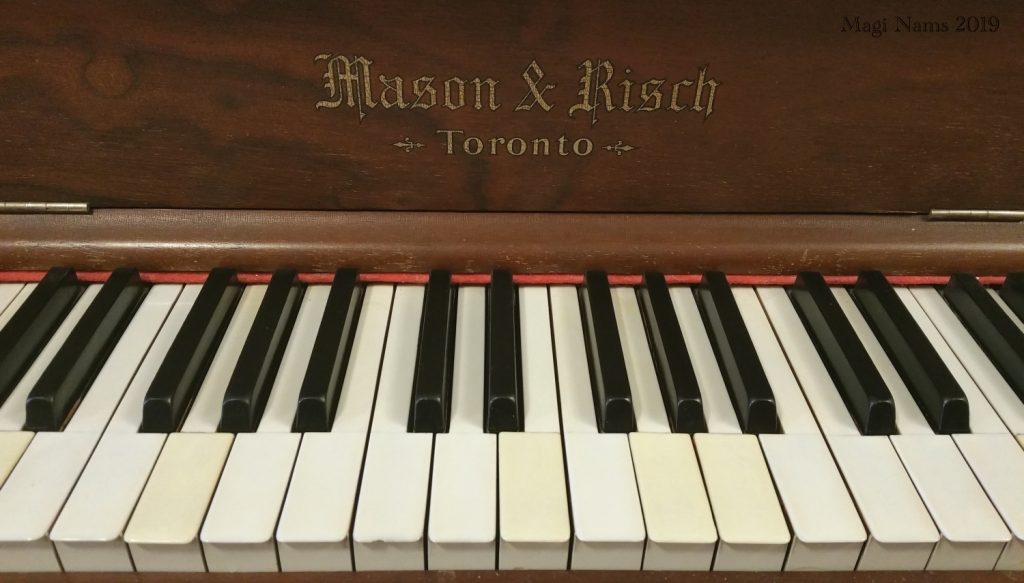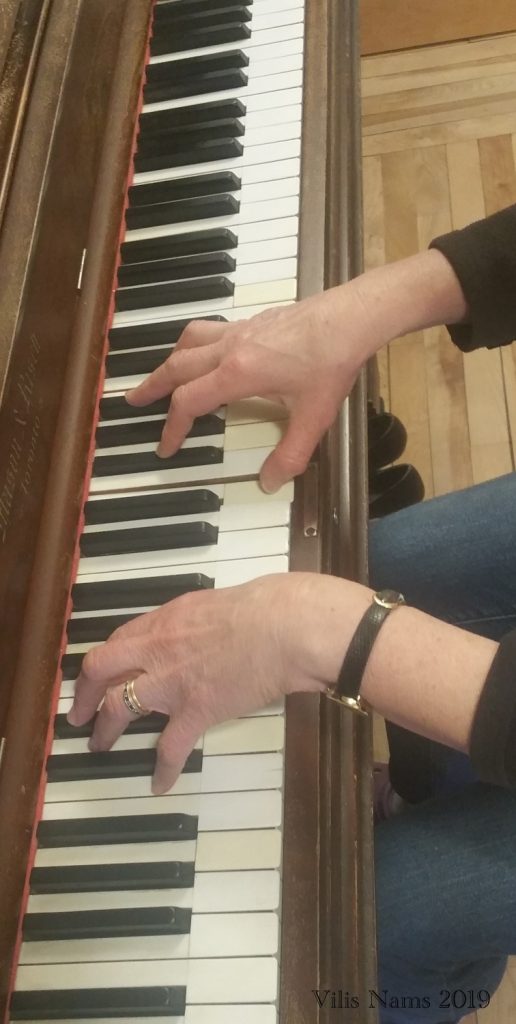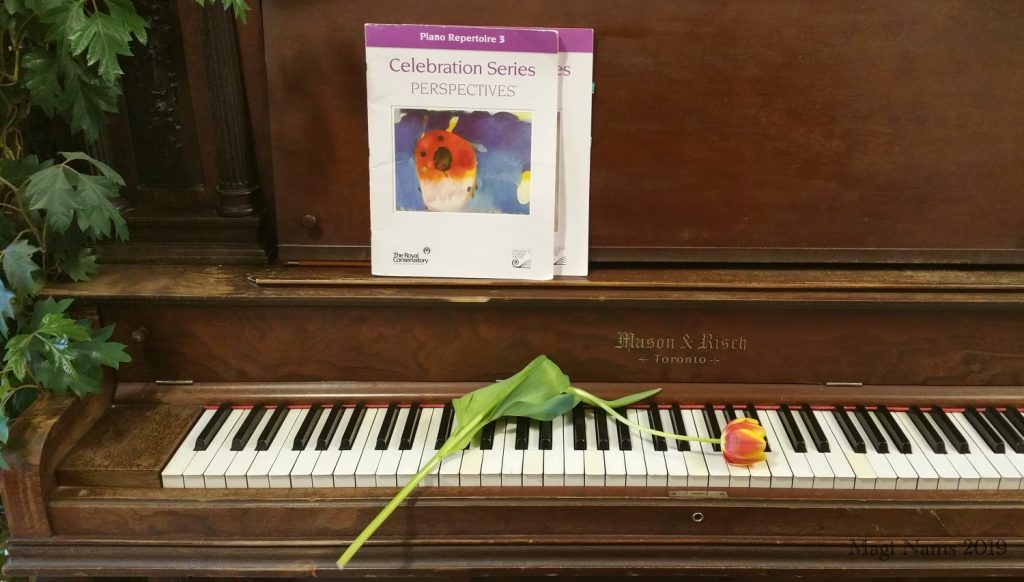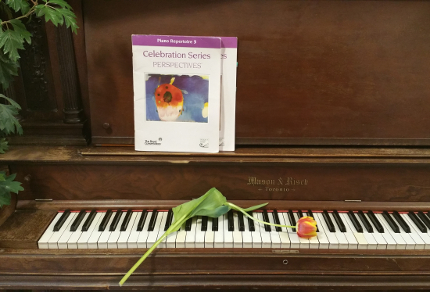Faithfulness, like playing the piano, means taking action, being accountable, showing up every day, and never, ever giving up.
In my last Exploring Faith post Who Am I to Receive a Gift of Such Beauty? I delved into how Jesus doesn’t discard people, no matter who they are or what they’ve done. Today, on a mild, drizzly, spring day caught between Good Friday and Easter Sunday, I’m writing about how faithfulness is a lot like tinkling the ivories.
Faithfulness is a huge subject that’s difficult to distill it into a few points. However, I’ve thought a lot about it, and it seems to me that faithfulness has two main facets: honouring commitments we’ve made and trusting in promises we’ve been given.
Keep promises
Honouring a commitment means keeping promises or vows that we’ve made to ourselves, to other people, or to God. In our daily lives, we make all kinds of commitments. We might commit ourselves to improving our health by exercising, losing weight, or eating a more nutritious diet. We might commit ourselves to learning a language or playing a sport or musical instrument. We might commit ourselves to being a more thoughtful friend or a kinder neighbour. We might commit ourselves to building a strong marriage or spending quality time with our children. We might commit ourselves to developing a closer relationship with God or following more closely in Jesus’ footsteps.
Take action
These kinds of commitments point us toward a goal we want to achieve, a life situation we want to improve, or a spiritual connection we want to deepen. The commitment is now, but the rewards of the commitment are in the future. Honouring a commitment involves taking steps that will bring us closer to fulfilling whatever it is that we’ve committed to doing. This means investing time, effort, and self-discipline. It means taking action, often both mentally and physically.
A piano plan
Here’s an example from my life. I play the piano. A while ago, I decided that I’d like to improve several aspects of my playing; in particular, I’d like to develop a lighter, more relaxed touch, more speed, and to be able to sight read music more easily. When I made that decision, I knew the improvements weren’t just going to happen because I wanted them to happen. They would require experimenting with body mechanics, facing my fears about sight reading, and doing lots of practicing.
So, I hatched a plan. I decided I would basically start all over again. I made a commitment to myself to learn to play every study and repertoire piece in a Grade 1 series, then in a Grade 2 series, then a Grade 3 series and so on, up to and including Grade 8, which is the level I’d reached before I cooked up this plan. Just to give you an idea, each grade includes about forty-five pieces.

My Old, Trustworthy Piano (© Magi Nams)
Be accountable
Now, in some areas of my life, I have a lot of discipline, but playing the piano regularly and with intent is not one of them. I knew that I would need help with this plan, and I knew that I would have to be accountable to someone. So, I enlisted the help of my piano teacher. At first, I think she was a little puzzled as to why I would want to start over, but she came onboard and agreed to pass each piece only after I showed her that I’d mastered the notes, timing, interpretation, and speed—in essence, after I could play the piece the way the composer had intended it to be played. No short cuts allowed.
Prepare to be humbled
I have to tell you that this piano-skill-improvement commitment is much bigger than I originally realized. And it’s humbling. When it comes to playing piano, I have plenty of weaknesses. Reaching my goal is going to take me years of work. So far, I’ve played through the Grade 1 and Grade 2 series, have passed nineteen pieces in the Grade 3 series and am working on nine others, plus a Grade 3 study.
I’ve had to put aside any lofty impressions I might have had about my playing abilities. I’ve also had to recognize that, as a pianist, I’m very much a work in progress. It’s nice that I don’t freeze up any more when I first see a new piece, but there are still many days when my mind and hands refuse to work together, and there are days when I have absolutely no interest in playing. On nearly all of those days, I play anyway. I sit down at the piano, and I start somewhere. I do it because I want to honour the commitment I’ve made, hoping and believing that I’ll get to a better place in the future.
Even when we have no proof other than what our hearts tell us
Like other Christians, I believe and know in my heart that through his sacrifice, Jesus gave me the gift of eternal life, even when I have no proof other than what my heart tells me. That’s faith. Faithfulness is acting on this belief. Faithfulness is doing something. Faithfulness is taking steps to honour my commitment to follow Christ. Just like improving my piano playing, laying the groundwork for increased faithfulness requires time, effort, and self-discipline.
Show up every day
In order to develop, maintain, and strengthen a close, committed relationship with Jesus, I need to show up every day. I need to put him first in my life and keep him first in my life, carrying him with me in Spirit throughout my day. On days when I’m racing from one task to the next, I need to set aside a sacred quiet time to meet with Jesus, to read God’s word, to pray. On days when my faithfulness energy lags, I need to sit at Christ’s feet and start somewhere, believing and knowing in my heart that my future with him holds hope and great joy, even when I have no proof in front of me.
Faithfulness grows
Every time we read the bible and seek to know Christ better through his teachings, the fruit of faithfulness grows within us. Every time we become a servant and obey God’s commands, faithfulness grows within us, just as it does every time we come together to worship Christ and learn from God’s word. Every time we attend a Bible study or prayer group or Christian retreat, faithfulness grows within us. Every time we pray to God the Father in Christ’s name, crying out in times of need or shouting praises in times of joy, faithfulness grows within us. Every time we lean on Christ for strength when we have none and draw close to him for comfort when our world cracks or shatters, faithfulness grows within us. Throughout our Christian journey, this fruit of the Spirit enriches us, molding us more closely to the pattern of Jesus Christ, our saviour.
Don’t give up meeting together
Our relationship with Christ is a personal thing, but being accountable to other Christians can spur us on in it, in the same way that being accountable to my piano teacher has spurred me on in my quest to improve my skills and confidence. The book of Hebrews tells us: And let us consider how we may spur one another on toward love and good deeds, not giving up meeting together, as some are in the habit of doing, but encouraging one another—and all the more as you see the Day approaching.2
There’s no shame in asking for help and in recognizing the need for Christian community to inspire us and hold us accountable. We are all part of one body, and Christ lives within each of us.
We’re all works in progress
No matter whether we’re new believers or have been Christians for as long as we remember, when it comes to faithfulness, we’re all works in progress. The Holy Spirit meets us wherever we’re at on our faithfulness journey and, as we mature and grow stronger, leads us a step farther along the path, and then another step.
Expect to grow tired sometimes, and expect to be humbled. Expect to be shown your weaknesses, and expect to realize that this commitment to following Christ is perhaps much bigger than you might have realized. Expect the journey to last the rest of your life, and expect to start reaping the rewards of your commitment—a more constant, intimate relationship with our beloved saviour and a more devoted submission to God’s will in our lives.
Many of Jesus’ teachings can be boiled down to one word: love. When asked by a teacher of the law which is the greatest command, Jesus replied, “Love the Lord your God with all your heart and with all your soul and with all your mind and with all your strength,” to which he added, “The second is this: ‘Love your neighbour as yourself.’ There is no commandment greater than these.”3 As well, Jesus told his disciples, “A new command I give you: Love one another. As I have loved you, so you must love one another. By this everyone will know that you are My disciples, if you love one another.”4
Show love
We honour our commitment to follow Jesus by showing love—love for him, love for God the Father, love for the Holy Spirit, love for our Christian sisters and brothers, love for people around us who need love in whatever situation they’re facing. We are Christ’s ambassadors. Through our faithful acts of love, people who don’t know Jesus, or Christians who are reeling from one of life’s punches, might catch a glimpse of our saviour or get a good, long look at him and want to draw near to him or nearer to him.
We won’t know in our lifetime on earth what consequences our words and actions might have, regardless of how small they are. Charles Schulz, who created the Peanuts comic strip, once said, “Little things we say and do in Christ’s name are like pebbles thrown into water. The ripples spread out in circles, and influence people we may know only slightly and sometimes not at all.”
A faithfulness model
When I think of faithfulness, I always think of Jesus in the Garden of Gethsemane. Torn with anguish, he knelt down and prayed, “Father, if you are willing, take this cup from me; yet not my will, but yours be done.” Jesus is our greatest role model for honouring a commitment. In Hebrews we read, So, my dear Christian friends, companions in following this call to the heights, take a good hard look at Jesus. He’s the centrepiece of everything we believe, faithful in everything God gave him to do.5
Honouring a commitment means taking a stand. It means taking a risk. It means doing the reps and playing the game with every beat of our hearts, like Christ did.
Trust promises we’ve been given
Let’s move on to the second facet of faithfulness: trusting in promises that we’ve been given. I trust the vows that my husband made to me on our wedding day. I trust my friends to point out my faults gently and to enjoy a good laugh with me when I need it.
As Christians, we need to trust God’s promises even more than promises made by our spouses, family members, friends, or co-workers. In Jeremiah we read, “For I know the plans I have for you,” declares the Lord, “plans to prosper you and not to harm you, plans to give you hope and a future.”6
God wants good things for us. God is good things for us, and he doesn’t let us down. Proverbs tells us, Trust in the Lord with all your Heart and lean not on your own understanding; in all your ways submit to him, and he will make your paths straight.7 As Christians, we need to trust God with every aspect of our lives and constantly seek his guidance. We need to embed in our lives the fact that Jesus is with us 24/7. In Matthew, Jesus tells the disciples, after his resurrection, “And surely I am with you always, to the very end of the age.”8
When we lose track of promises
I don’t know about you, but sometimes I lose track of God’s promises. Sometimes I get so caught up in the day-to-day scurry of demands that my life shrinks to a constricted tunnel with my eyeballs at one end and a dime-sized piece of the world at the other. My view becomes centered on me, me, me and whichever compressed bit of life I allow in at any given time. When I’m caught up in myself like that, it’s easy to forget that God has plans to prosper me and that Christ is right there beside me.

At My Piano (© Vilis Nams)
Here’s an example. It’s been almost four years since I took my Grade 8 piano exam. I prepared for that exam for two years. I memorized all six of my exam pieces and, for several months leading up to the exam, practiced two or more hours every day. I set myself a goal, and I told God about it. Because I started playing in my late forties and am a nervous performer, I knew that the goal I’d set was reaching high.
During the days before the exam, I rehearsed my pieces over and over, trying to fix the last few little slip-ups. I played scale after scale, trying to tidy up remaining dicey bits of the challenging technical requirements. There’s nothing wrong with wanting to perform well, but I became so focused on perfecting every bit of technique and every bar of music that I completely lost the joy of playing.
On exam day, I was tied in knots with anxiety. All I could think about was that I didn’t know everything. I became convinced that taking the exam was a big mistake, and I was sure I was going to mess up. I felt there was no possible way I could reach my goal.
The exam itself was a blur. I was so nervous, my brain seemed disconnected from the rest of me. My hands seemed to remember what they were supposed to do, but when the exam was over, I was sure I had scored terribly—maybe even failed. As I drove home, tears streamed down my face, and I railed against God, “Why did you abandon me?”
Two days later, my piano teacher phoned to tell me I had passed the exam with distinction. I knew then what I should have known all along. God hadn’t abandoned me during the exam. I had abandoned myself. Instead of trusting in him to lead me through it, I’d worked myself into a knot by focusing on every little thing I couldn’t do well and dismissing all the things I could do well.
As Christians, how often do we forget to trust in God’s promised plan to prosper us? How often do we forget Christ’s assurance that he will always be with us, in all things, in every circumstance? We’ve been given so many other promises, too.
Quieting my anxious heart
I need to work on faithfulness. Maybe you do, too. I need to work on quieting my anxious heart so I can hear God’s words telling me that he wants to prosper me, and so I can feel Christ’s presence beside me. I need to sit at Jesus’ feet and begin my faith journey again every day, learning to trust God more deeply and to revel in the joy, unconditional love, and other gifts he’s promised.
Faithfulness is the fruit of the Holy Spirit, and the Spirit lives within us. 2 Peter provides a wonderful summary of how we can welcome the Spirit’s ongoing work in us and take steps to speed that work along: So don’t lose a minute in building on what you’ve been given, complementing your basic faith with good character, spiritual understanding, alert discipline, passionate patience, reverent wonder, warm friendliness, and generous love, each dimension fitting into and developing the others. With these qualities active and growing in your lives, no grass will grow under your feet, no day will pass without its reward as you mature in your experience of our Master Jesus.9
In summary, faithfulness means honouring our commitments, it means trusting in promises we’ve been given, and it means taking action.

A Lesson in Faithfulness (© Magi Nams)
Scriptural References:
- Romans 10:8-10
- Hebrews 10:24-25
- Mark 12:30-31
- John 13:34-35
- Hebrews 3: 1-2
- Jeremiah 29:11
- Proverbs 3: 5-6
- Matthew 28:20
- 2 Peter: 1:5-9


